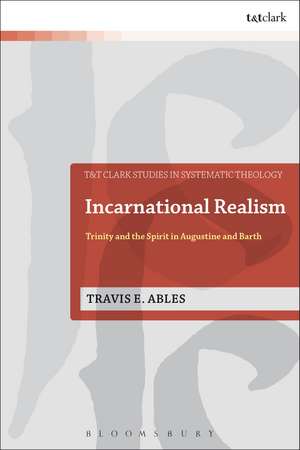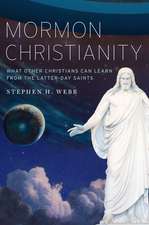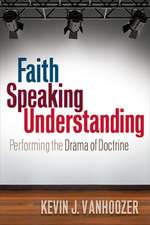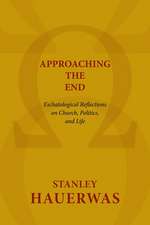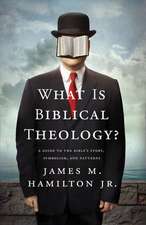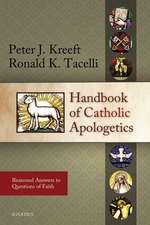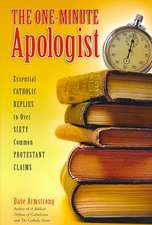Incarnational Realism: Trinity and the Spirit in Augustine and Barth
Autor Dr Travis E. Ablesen Limba Engleză Paperback – 17 dec 2014
| Toate formatele și edițiile | Preț | Express |
|---|---|---|
| Paperback (1) | 258.33 lei 6-8 săpt. | |
| Bloomsbury Publishing – 17 dec 2014 | 258.33 lei 6-8 săpt. | |
| Hardback (1) | 891.92 lei 6-8 săpt. | |
| Bloomsbury Publishing – 19 iun 2013 | 891.92 lei 6-8 săpt. |
Preț: 258.33 lei
Preț vechi: 295.83 lei
-13% Nou
Puncte Express: 387
Preț estimativ în valută:
49.44€ • 51.42$ • 41.43£
49.44€ • 51.42$ • 41.43£
Carte tipărită la comandă
Livrare economică 13-27 martie
Preluare comenzi: 021 569.72.76
Specificații
ISBN-13: 9780567659774
ISBN-10: 0567659771
Pagini: 288
Dimensiuni: 156 x 234 x 15 mm
Greutate: 0.4 kg
Editura: Bloomsbury Publishing
Colecția T&T Clark
Locul publicării:London, United Kingdom
ISBN-10: 0567659771
Pagini: 288
Dimensiuni: 156 x 234 x 15 mm
Greutate: 0.4 kg
Editura: Bloomsbury Publishing
Colecția T&T Clark
Locul publicării:London, United Kingdom
Caracteristici
Sheds new light on Augustine's understanding of the Trinity in relation to God's transcendence.
Notă biografică
Travis E. Ables (Ph.D., Vanderbilt University) is Visiting Assistant Professor of Historical Theology at Eden Theological Seminary, St. Louis, USA.
Cuprins
1. The Problem of the Spirit in Contemporary Trinitarian Theology\2. A Pneumatology of the Knowledge of God: The Aporetic of Perfomance and Ascent in The Trinity\3. The Apophaticism of Ethical Performance: The Totus Christus, Relation and Deification in Augustine\4. The Knowledge of God as Election: Barth's Dialectical Pneumatology of Participation\5. The Hypostatic Union and the Vicissitudes of Augustinian Trinitarianism in CD4\6. The Problem of Trinitarian Ontology and the Ethics of Gratuity After Hegel.
Recenzii
All in all, Ables's book is carefully researched, historically attuned, and written in clear prose. Scholars of Augustine, Barth, and Trinitarian theology, systematic theologians, and graduate students in theology will find the book informative and well worth their time, as will more advanced undergraduates.
In Incarnational Realism, Travis E. Ables offers an analysis of Augustine and Barth's respective pneumatologies in order to counter this 'standard narrative' of a supposed trinitarian decline in Western and Augustinian theology . Much is to be commended in Ables' work. He is a clear writer with a gift for lucid explanations of complex ideas and schools of thought. As such, the book is as helpful for demystifying contemporary trajectories in trinitarian theology as it is for analyzing the thought of Augustine and Barth . Ables' volume is an important work for those interested in Augustine, Barth, and contemporary trajectories in trinitarian theology. Ables succeeds in presenting Augustine and Barth as exemplars of Western trinitarian thought at its best: namely, of God as a singular act of self-giving revealed in Christ and in which we participate through the Spirit. Both students and critics of Augustine and Barth will find much insight and value in this book.
Scholars of Augustine, students of Karl Barth, intellectual historians and systematic theologians are all indebted to Ables for this forceful yet elegant book.Writing with an intellectual marutirty and a scholarly grasp that is especially remarkable, ables plunges deeply and creatively into the thought of two great masters of Trinitarian speculation in order to uncover the all too often obscured or misread implications of their models for conceiving the personhood of the Holy Spirit.
This learned, wide-ranging, ad impressive study merits close attention.
In Incarnational Realism, Travis E. Ables offers an analysis of Augustine and Barth's respective pneumatologies in order to counter this 'standard narrative' of a supposed trinitarian decline in Western and Augustinian theology . Much is to be commended in Ables' work. He is a clear writer with a gift for lucid explanations of complex ideas and schools of thought. As such, the book is as helpful for demystifying contemporary trajectories in trinitarian theology as it is for analyzing the thought of Augustine and Barth . Ables' volume is an important work for those interested in Augustine, Barth, and contemporary trajectories in trinitarian theology. Ables succeeds in presenting Augustine and Barth as exemplars of Western trinitarian thought at its best: namely, of God as a singular act of self-giving revealed in Christ and in which we participate through the Spirit. Both students and critics of Augustine and Barth will find much insight and value in this book.
Scholars of Augustine, students of Karl Barth, intellectual historians and systematic theologians are all indebted to Ables for this forceful yet elegant book.Writing with an intellectual marutirty and a scholarly grasp that is especially remarkable, ables plunges deeply and creatively into the thought of two great masters of Trinitarian speculation in order to uncover the all too often obscured or misread implications of their models for conceiving the personhood of the Holy Spirit.
This learned, wide-ranging, ad impressive study merits close attention.
